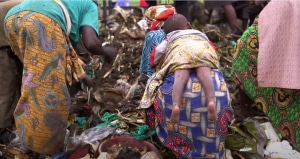The woman is in charge of the functioning of domestic life. She does the housework and takes care of the children and other family members. In addition, women provide the bulk of the productive force in the agricultural sector, since the vast majority of women work in this sector, which remains the dominant activity in the Burundian economy.

“They leave at dawn with their children on their backs and return in the evening, exhausted, still having to deal with the supply of water, fuel, the maintenance of livestock and the preparation of meals”. Gisèle, Director of FXB Burundi.
When women can exercise an activity of their choice, when they have access to financial services, and when their rights are recognized, they not only gain economic and social independence, but they live healthier lives. The more power mothers have over household finances, the longer girls are in school, and the more their children, their communities, and their countries benefit.
FXB’s AMIE project thus has three specific objectives:
- Strengthening women’s economic and resilience capacities.
- Joining a community health insurance scheme that will allow these women’s families to access adequate health care.
- Access to education and vocational training for their children.
The first phase of this AMIE program will involve 100 women and their families living in rural areas – approximately 700 people. The change sought is their empowerment, through the achievement of their economic and social resilience, satisfactory health status, and access to education and training for their children.
It is also to induce behavioral changes in their husbands and partners. They will thus be duly sensitized to gender discrimination, women’s rights and greater involvement on their part in the life and care of the family.
The “access to education and professional training for their children” component is also essential. Children will only be able to avoid reproducing the patrilineal customs of their community if girls and boys are equitably integrated into the different levels of the school system and if their family and community environment promotes more egalitarian practices.
Learn more : https://fxb.org/real-life-stories/testimonial/in-burundi-rural-women-are-the-backbone-of-the-household-and-the-beating-heart-of-the-economy/
December 2021
